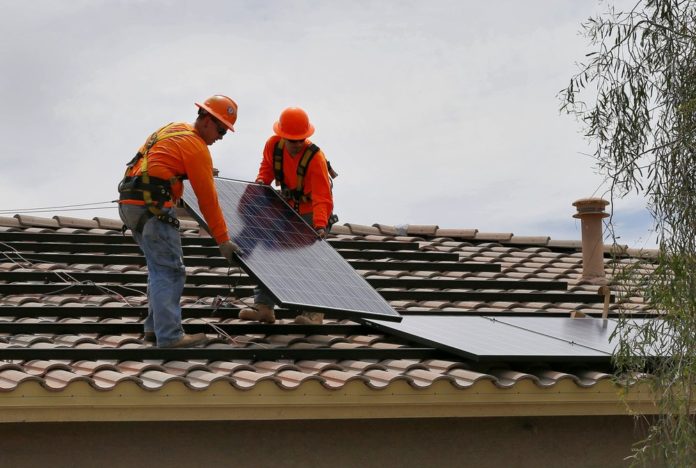
A debate among the four candidates seeking two seats on the commission that regulates Arizona utilities revealed sharp differences in their approaches to the job as the state adjusts to climate change and a shrinking water supply.
The two Republicans on the November ballot for the Arizona Corporation Commission said they would leave it up to the utilities to decide if they wanted to pursue clean energy sources such as solar and wind. And they said the state should not be involved in helping communities that are seeing coal-fired power plants shuttered — mainly on tribal lands or in small eastern Arizona communities — replace the jobs and tax revenue.
The Democrats strongly disagreed, saying that tribes and communities adjusting to life without coal plants need the commission’s help and that setting standards for the minimum amount of energy utilities should get from renewable energy is critical.
“We are on the frontlines of the climate crisis,” Democratic candidate Lauren Kuby said in the Clean Elections Commission debate broadcast on Arizona PBS Monday night. “But with crisis comes opportunity, and we need to lead a clean energy transition for our state. ”
Kuby, a former Tempe city councilwoman, and Democratic candidate Sandra Kennedy, a current commissioner seeking re-election, said the commission needs to also work to encourage energy efficiency, which they said pays off in both lower consumer costs and avoiding building new power plants.
The state currently requires 15% of electricity be obtained from renewable sources by 2025 under commission rules adopted in 2006, but the commission has twice rejected much more robust requirements in the past 18 months. Kuby said current standards have saved huge amounts of water used in traditional power plants and saved ratepayers $2 billion.
“So those rules that were established by the Corporation Commission, which sometimes our Republican opponents have said they want to roll back, had been supreme in saving consumers money,” Kuby said.
They noted that solar is now the cheapest form of new power plants available.
The two Republicans, Nick Myers and Kevin Thompson, said the commission made mistakes by requiring utilities to build some renewable plants, pointing to one that Arizona Public Service had built near Gila Bend that is more costly to operate than expected.
Myers is a former software engineer and businessman who is now a policy advisor to current Republican commissioner Justin Olson. Thompson is a Mesa city councilman and Air Force veteran who worked as an engineer for Southwest Gas, one of the companies overseen by the commission.
“We can’t continue to mandate and force the companies to shift,” Thompson said, arguing it leads to locked in costs that the commission is required to force ratepayers to fund.
“Anytime you mandate a company to do something, you are virtually guaranteeing they will get that back and ratepayer money,” Myers said. “You’re basically taking away their accountability.”
On whether to help tribes and communities that are seeing coal plants shuttered, they said the state should not be involved. Instead, Myers and Thompson said the federal government is responsible for helping tribes and communities recover, although they proposed placing new “micro-nuclear” plants in the region to replace the jobs.
“This is something that the federal government has forced upon Arizona, and it should be the federal government; they should be the ones that are bailing out these communities if there’s a bailout,” Thompson said.
“But the bigger issue here and is it’s not the job of the ratepayers in Arizona to get into foreign aid,” Myers said. “If you’re talking about tribal lands, that’s the foreign aid comes under the federal government.”
They said a more fair transition is to work to pull in new technologies to the area.
For their part, Kuby and Kennedy said it absolutely is the commission’s role to help. And Kuby noted that it is cheaper now to build and run a solar plant than to buy the coal needed to run an existing coal-burning power plant.
“We’ve been able to grow our cities, Tucson, Phoenix, all of our cities because of extracting resources from these coal-based communities,” Kuby said. “These communities have been dependent on coal, and we cannot leave them behind.”
Republished with the permission of The Associated Press.














